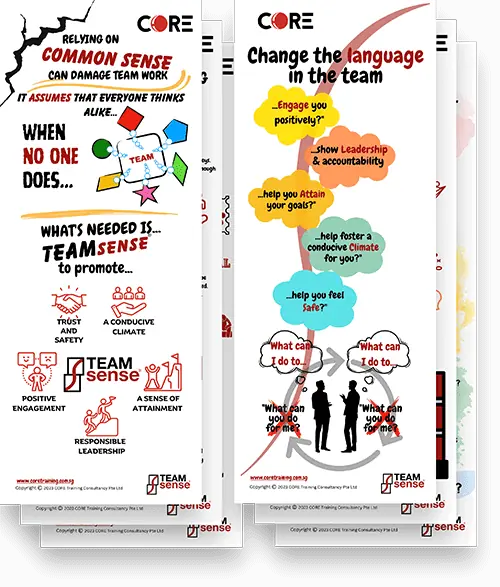Have you recently been promoted to a leadership position? Has this left you wanting to improve your leadership skills to be the most effective leader possible? If that’s the case, then this article is for you.
No matter what industry you’re working in, there are a few important leadership skills that will form an essential part of your success. This article takes a look at several key skills needed to get you started on the right path. Let’s jump right in!
Self-Awareness
Successful leaders use self-awareness to fully comprehend their roles in the organisation as well as the functions and responsibilities of their team members. By being self-aware, leaders have a better understanding of:
- Their own abilities and individual team member interactions.
- How their own abilities contribute to the success of the team.
- The skills they need to work on to become more effective leaders.
Integrity
Having integrity means being both truthful and honest in your leadership style. Good leaders can make ethical decisions as well as maintain the positive image of the organisation in all their dealings with employees and customers.
To lead with integrity means to do the following:
- Treat team members with respect.
- Be open to honest and effective relationship building.
- Provide constant and positive reinforcement.
- Avoid being biased and nepotistic during decision making, especially when you need to hire people.
Communication
Strong and open communication is quite possibly one of the most important leadership skills that a successful leader should have. Being a skilled communicator involves both listening and communicating in a variety of ways.
As one of the top skills you need, becoming an effective communicator involves the following:
- Being able to transmit information clearly.
- Inspire others by effectively communicating goals, plans and tasks to subordinates, colleagues, senior staff and even customers.
Interpersonal Communication
A study conducted across several different industries has shown that interpersonal communication is one of the most important skills needed for effective leadership. With this skill leaders can benefit in the following ways:
- Strong communication skills form the crux of effective communication between you and your team members.
- Makes it easier to address areas of improvement effectively and productively.
- Better communication contributes to a more productive workforce.
Active Listening
For the most part, active listening is a skill that teaches you to become a better leader. Communication is not only about speaking well but also about listening to understand and not only to reply.
Active listening can help you achieve the following:
- Improve your own understanding of a particular situation, which ultimately may make solving a problem much easier.
- Builds stronger relationships between you and your team as well as other third parties such as customers and vendors.
- Motivates employees as they feel heard and valued.
Relationship Building
Another core leadership skill that many organisations require is relationship building. This is how being able to build relationships will help you:
- Improves negotiation skills.
- Makes it easy to approach and connect with team members and superiors.
- Strengthens networking and teamwork skills.
Coaching
Coaching is an effective leadership style that’s made up of recognising various team members’ strengths and weaknesses. It’s also an excellent way to help individuals improve their own skills.
Having a strong coaching skills will be beneficial in the following ways:
- Provides training and skills development to other employees which can improve overall productivity.
- Empowering employees with on-the-job training is an excellent way to improve employee engagement.
- Positive way to guide employees toward job improvement by focusing on positive attributes.
Time Management
With so much to do, time management forms another one of the essential skills that innovative leaders need to keep them headed in the right direction. Not only will effective time management reduce daily stress, but it contributes to your ability to deal with different challenges.
To be a strong leader, you need to:
- Delegate tasks to achieve results.
- Set SMART goals that each employee can understand and achieve.
- Multitask where necessary and have time available to assist struggling staff members.
- Practice time management skills and teach this important skill to junior employees.
Emotional Intelligence
A critical part of leadership training involves learning emotional intelligence. This teaches leaders interpersonal skills that enable them to address employee relationships in an empathetic and judicious manner.
Incorporating emotional intelligence into your leadership style will enable you to:
- Improve employee engagement by addressing team members on their levels.
- Make employees feel seen and heard, especially in one-on-one sessions.
- Share new ideas more easily and more effectively.
- Deal with conflict resolution more effectively.
Decision Making
Making decisions goes hand in glove with taking on a leadership role, making it a core fundamental appreciated by companies. As a valuable leadership skill, decision making involves formulating choices that will influence the outcome of goal achievements. It also affects the way you supervise your employees in their decision making processes.
Great leaders use good decision making skills to achieve the following:
- Creates a collaborative environment based on strategic thinking and innovative ideas.
- Improves time management and productivity.
- Helps create uniformity in your general work environment.
Problem Solving
Problem solving is one of the most important leadership traits required. This is because no matter what industry you’re working in, you will at some point face issues.
To solve problems, effective leadership involves:
- Stay calm under pressure.
- Practice analytical and critical thinking skills especially when faced with difficult decisions.
- Learn to make quick decisions to overcome difficult obstacles.
- Devising a step-by-step solution to each challenge.
- Encourages and teaches employees to find solutions for future similar problems.
Creativity
Creative leadership is an essential skill in certain industries. This is because creative strategies can help managers and leaders develop more effective processes and solutions.
Typical examples of how creativity assists leaders include:
- Makes it easier to come up with new ideas to achieve company goals.
- Helps to foster an inclusive and supportive company culture.
- Encourages healthy risk-taking to achieve goals.
Management
Successful leaders will also be required to manage their teams by steering them in the direction needed to accomplish specific business objectives. To be a more effective leader, new managers need to incorporate their general industry knowledge with new skills such as budgeting, planning or even marketing.
Typically, management skills can include a few of the following:
- Allocating resources to various departments.
- Staffing necessary projects.
- Guide teams through the daily work processes.
- Provide unlimited access to on-the-job training.
Strategy
Good leadership also involves the ability to visualise and plan the best strategies to achieve the organisations goals. This can include anything from leading a team to achieve sales targets to increasing brand awareness.
With good strategic thinking skills, leaders can achieve the following:
- Combine strategy with problem solving to achieve the organisations common goal.
- Make sound decisions based on an assessment of various outcomes.
- Use strategic techniques to influence employees and teams to enhance overall performance.
Delegation
Delegating is without a doubt one of the more necessary core responsibilities every effective leader should be able to master. New leaders who are accustomed to doing everything themselves can find this one of the more difficult soft skills to master.
Being able to delegate tasks and responsibilities enables a good leader to do the following:
- Facilitate teamwork.
- Lead to better decision making.
- Create autonomy.
- Enables the leader to focus on other equally important aspects.
Skills Management
As a leader, you need certain skills which often include the abilities needed to perform daily duties. These can include the tasks associated with overseeing your team and finding innovative ways to achieve set goals.
Fortunately, these skills can be taught and are often not a requirement to qualify for leadership positions. Courses and on-the-job training will go a long way toward learning these skills.
Some of the more significant aspects you can gain from brushing up on your skills management include:
- You can utilise your own skills management to make the most of your employee’s talents and abilities.
- Makes it considerably easier to mentor junior employees, which in turn improves employee engagement.
Motivation
All leadership roles require a significant amount of motivational skills. These abilities are not only used to build relationships but are excellent for team building as well.
Being motivated will help you in these keyways:
- Having a motivated approach makes it easier to set clear and effective goals.
- Being self-motivated enables a successful leader to share this motivation with team members, which in turn can increase productivity.
- Motivation facilitates better decision making.
- It’s easier for motivated individuals to combat pessimism during the tough cycles often experienced in business.
Conflict Resolution
Most people shy away from any potential conflict. However, as a manager, conflict resolution is an essential leadership skill. While not always easy, leadership often demands instances of mediating conflict resolution.
By sharpening your conflict resolution skills, you’ll achieve the following:
- Resolve interpersonal issues and disagreements between staff members.
- Encourages team members to treat each other with respect.
- Avoid issues that can disrupt business flow and achieving organisational goals.
Confidence
Strong leadership skills must always include a high dose of self-confidence. This is because it’s necessary to take the required risks to accomplish goals. By having confidence, leaders not only have high levels of self-awareness but usually already possess the other leadership traits needed to be successful.
Having high levels of confidence means you can:
- Directly deal with conflicts and other staff-related concerns.
- Are less likely to procrastinate or ignore problems.
- Nurture innovative ideas and encourage forward thinking.
Critical Thinking
With the global business landscape evolving at a speedy rate, critical thinking has become an important leadership trait to have. In addition to making more effective decisions, critical thinking also creates and encourages a high-performing team.
Critical thinking also has the following benefits:
- More effective problem solving.
- Simpler decision making processes.
- Employee accountability processes are easier to manage.
Adaptability
Whether you’re new to leadership, or simply looking for a way to enhance your existing leadership skills, you need to be able to adapt. Organisations are consistently evolving and require leadership styles to match.
Adaptability will assist you with:
- Managing change in evolving business environments.
- Easily finding innovative ways to deal with current and old problems.
- Teaching your team members the attributes to master new skills.
Empathy
Empathy is another skill that contributes to a positive work environment and can be defined as the ability to perceive and relate to the emotions, thoughts and experiences of all your team members.
Furthermore, born leaders who have a high level of empathy have the following traits in common:
- They can show understanding toward colleagues and their individual work perspectives.
- It also involves building strong relationships by making employees feel accepted in the work environment.
Decisiveness
A key aspect many organisations appreciate in their best leaders is that they are usually quick to make an impactful decision and slow to change their minds once they’ve decided how to achieve a goal.
Keep in mind that decisiveness doesn’t mean being stubborn, but rather refers to the ability to make quick and clear decisions. This is an important skill shared by top leaders such as Steve Jobs and other top successful company owners. Being decisive will mean the following for your organisation:
- Easier to make timely decisions to achieve organisational goals.
- Enables you to balance the pros and cons of a particular strategy and still be able to find the best solution.
Positivity
Born leaders find it easy to be positive in all their work interactions. Since positivity is a powerful attribute, it’s another core fundamental well worth focusing on. This means making thoughtful decisions and being authentic in everything they do.
Adding positivity to your arsenal of leadership skills means that you can easily:
- Inspire employees with your positive approach to all work tasks and goals.
- Create an environment of mutual respect between employees on all levels.
- Encourage employees to become resilient and optimistic.
- Easily identify employees with leadership potential for future training.
Summing It Up
There are many soft skills required to create effective leaders. In most instances, it may involve moving from your comfort zone and investing in formal training. It also involves a positive attitude and a new approach to learning the skills you need.
By working on the skills listed in this article, you’ll be well on your way to being a better leader. Keep in mind that CORE Training Consultancy provides tailored teambuilding solutions to empower and encourage creative leadership.
If you have found this article helpful, we urge you to share it with other new leaders who may be looking for ways to develop more effective leadership skills!




